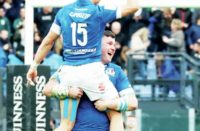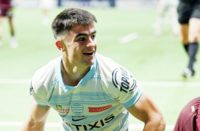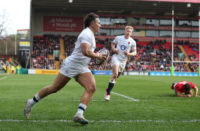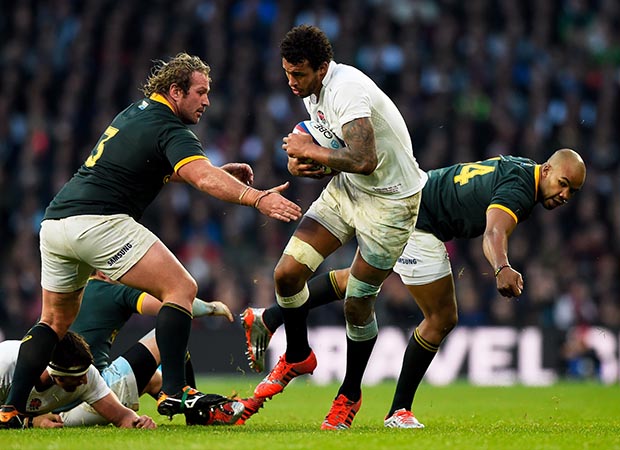 Courtney Lawes hits twice as hard in the tackle as most of his Red Rose team-mates, and it has earned him a reputation as the most destructive tackler north of the equator. It gives the Northampton lock what the England head coach, Stuart Lancaster, calls a “physical point of difference” – one of his key selection criteria – and it has projected Lawes into world class territory going into the 2015 World Cup campaign.
Courtney Lawes hits twice as hard in the tackle as most of his Red Rose team-mates, and it has earned him a reputation as the most destructive tackler north of the equator. It gives the Northampton lock what the England head coach, Stuart Lancaster, calls a “physical point of difference” – one of his key selection criteria – and it has projected Lawes into world class territory going into the 2015 World Cup campaign.
The latest reminder of the savage impact that Lawes can make was his cannonball hit on the French fly-half Jules Plisson in the Six Nations points-chase at Twickenham four months ago. The England second-row gave the term ‘lean and mean' renewed emphasis, striking with such force and borderline timing that the instant reaction of the French contingent in the crowd was that the contact was late, high, with the shoulder only, and merited a red card.
They were mistaken because it was legitimate in every respect. No action was taken because it was ribcage rather than neck-high, the timing was split-second precision as Plisson released the ball, and Lawes used both arms as he blasted his target. It was the sort of intrepid action-hero footage that Hollywood directors choreograph to sell their latest blockbusters, but the Lawes clip is the real deal. With barely a month to go until the opening match of the World Cup, when England
confront Fiji, it is also a handy reminder to the 2015 tournament organisers of the material they have at their disposal to ramp-up their promotional campaign.
One of the triumphs of the 1995 World Cup in South Africa was the way a divided public came together to support the Springboks, and my recollection is that there was barely a billboard in the country that did not carry a poster of wing Chester Williams, the only non-white in the team, emblazoned with the words, “One Team, One Nation”. For the record, that mantra-of-the-moment was coined by the then SA Rugby Union chief executive, Edward Griffiths, who stood down as Saracens CEO at the end of last season.
Twenty years on political parallels between England 2015 and the urgent nation-building mission in South Africa in 1995 are few and far between. However, as Griffiths understood back then, creating a sense of occasion, along with an injection of feel-good factor and energy, is intrinsic to the success of any global sporting event. As Williams and the Springbok captain, Francois Pienaar, proved in 1995, nothing generates that better than inspirational players – and Lawes has that hallmark in common with the two South Africans.
Although he's a self-proclaimed disciple of the laid-back Caribbean approach to life when he's at home, there's no ‘cool-runnings' from the Saints man on the pitch. Lawes is usually red-hot, whether he's crash-tackling, finding gaps in the defensive line, calling lineouts, or drawing two tacklers before sending a wing racing clear to score from 80m out with a crisp pass – as he did for Chris Ashton's spectacular try against Australia in 2010.
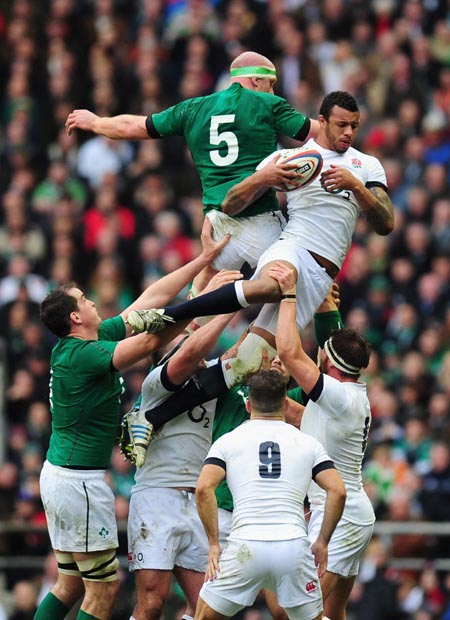 For those who, like me, have been wondering where the posters, flags, ticker-tape and fanfares are ahead of the World Cup – with virtually zero visibility so far in London and the South East – the word from Twickenham insiders is that it will start to materialise from this week onwards. You hope that when it does, a player like Lawes is in the forefront.
For those who, like me, have been wondering where the posters, flags, ticker-tape and fanfares are ahead of the World Cup – with virtually zero visibility so far in London and the South East – the word from Twickenham insiders is that it will start to materialise from this week onwards. You hope that when it does, a player like Lawes is in the forefront.
Every World Cup gives Rugby Union a chance to demonstrate that it is a great sport in which everyone can participate irrespective of physique, creed, class or colour – and as tournament hosts that is a message that the RFU are eager to send to English youngsters, and the public at large.
If England want an action man as a poster icon, whose rise to the pinnacle of the sport embodies the inclusivity of the England team in 2015, they need look no further than the 6ft 7ins Lawes. He was born in Hackney and raised in Northampton by his mother, Val, who is English and a senior prison officer, and his father Linford, who is Jamaican and a property developer and former nightclub doorman.
Lawes played basketball and football first at state school, and, despite living close to Franklin's Gardens, he was a late convert to the game. After playing a few games of rugby at Northampton School for Boys, he got the bug at 16, and having joined the Northampton Old Scouts club, like 2003 World Cup winners Ben Cohen and Steve Thompson before him, he soon attracted the attention of the Saints, and then the England age-group coaches.
While Lawes may have impeccable credentials as a modern England rugby role model, it is what he has achieved as a player since he won the first of his 38 caps from the bench against Australia in 2009 that is the bedrock of his credibility. There are times when he does not just rise to the occasion, but soars to meet the challenge, as he did throughout the 2014 Six Nations. He was also conspicuous in the autumn win over Australia, and, after being ruled out of the start of the 2015 Six Nations with ankle trouble, in the last two matches of the campaign against Scotland and France.
He has the iron-lunged mobility, ceaseless work-rate and mental resilience to belong in the same bracket as outstanding athlete-locks like New Zealand's Brodie Retallick and Sam Whitelock, and South Africa's Eben Etzebeth. The only drawback to his international career so far has been regular stints on the sidelines with injury. It was inevitable, therefore, that when Lawes arrived to be interviewed this week with his ankles strapped following training, there would be enquiries about his fitness. Given that he had emerged in credit from the gruelling Denver training camp, these were summarily dismissed by the Saints lock.
“It's nothing to worry about. It's part of the ‘rehab', and the fact is that I'm always going to have bad ankles. The strappings make sure we keep good maintenance on them. My ankle problems meant missing half the Six Nations, and all injuries are frustrating, but I do feel that more recently I've recovered a lot quicker, and that is important. Injuries in rugby are inevitable. It's about how fast you can get back in action, back pulling your weight in the squad.”
So, what about Colorado, and returning as the fittest England squad there's been? Lawes responds: “The camp was very good, but also the toughest training I've ever done. The heat combined with the fact you can't breathe very well made it extremely difficult. There were no easy sessions, quite the opposite.”
He reveals that his body never adjusted to the demands made on the players at altitude by the England coaches and conditioning staff. “Every time you got close to adapting, the coaches intensified the sessions. They never allowed us to get settled, and you never thought you were finally cruising. It's usual to get into a rhythm after a few days of hard training. But that was prevented deliberately. They managed to make it worse daily.”
According to Lawes, the England coaches delivered in full on their promise that the two weeks of sessions in Colorado would hurt: “They were all grim, and getting harder all the time. I remember one day that was just so relentless. A full-on game of rugby, followed immediately by sprinting exercises, followed by another fitness game. Throw in the conditions, and guys start to feel frustrated. There were no fisticuffs, no real blow-ups, but you do start to feel edgy under such intensity.”
Despite the pain Lawes says he has been impressed with the England coaching set-up. “This has been the best thought-out and planned pre-season I've known, and those coaches certainly know what they're doing.”
He adds that it was a good feeling to be back in their Surrey training facility, a mile lower than Denver. “It's so good to get more oxygen in your lungs, and to be working in less searing heat. I do know that I'd never felt close to being unable to cope with heat before – but I guess the thin air contributed to that feeling. We're now replicating here what we did for two weeks over there, and discovering just how well we've benefitted from the experience.”
Lawes says that he has not sensed a greater tension in the camp despite Lancaster's culling of the squad getting underway. “I haven't felt that – I'm usually pretty laid-back. I can't speak for other lads, however, I believe the mood in the camp is still strong, still good. We're all aware of competition and what we're here for. But we're also a tight group.”
The Saints lock says he's looking forward to playing a proper game of rugby, but says he is not stressing about the imminent warm-up Tests home and away against France. “I don't know if I'll play against France. I'll do what I'm told, and make sure I'm prepared when wanted.”
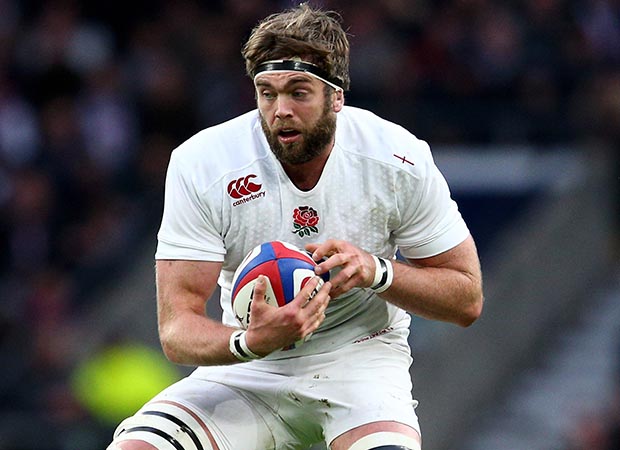 This unfazed outlook extends to all areas. Ask Lawes about his progress as a lineout caller and leader and his response is chilled. “It's going good. I've been doing the job a couple of years now and learning as I go. Everyone chips in a bit – Geoff (Parling, above), ‘Woody' (Tom Wood), George Kruis – it's very much about helping each other. If Stuart decided to pick me with Joe (Launchbury), then I'd be ready to do the job.”
This unfazed outlook extends to all areas. Ask Lawes about his progress as a lineout caller and leader and his response is chilled. “It's going good. I've been doing the job a couple of years now and learning as I go. Everyone chips in a bit – Geoff (Parling, above), ‘Woody' (Tom Wood), George Kruis – it's very much about helping each other. If Stuart decided to pick me with Joe (Launchbury), then I'd be ready to do the job.”
It's the same when you query whether he would rather have gone into this World Cup on the back of the Rugby Championship, like Australia, or prefers the position England and Wales are in?
“I prefer how we are doing it. The season ended and we got a break. Body refreshed, we returned to camp and cranked things up, went through the mill in Denver, but then returned to another week's break. We're getting a really good pre-season after the best series of fitness sessions I've ever been through. Of course, the real test will come with game-time, that's what all the hard work is for.”
Lawes says he's aware of the expectation on England, but doesn't let it worry him. “We all want to do our very best, for the nation and each other. But you cannot let that start affecting how you think about playing. I'm not a player who suffers pre- match nerves. I believe you have to train hard, leave nothing out there, and then do your very best on match-day.”
Lawes associates England's reputation as the ‘Nearly Men' of the Six Nations after being runners-up in four consecutive tournaments under Lancaster, with his experience of missing out with Northampton until they eventually nailed a big prize by winning the 2014 Premiership final.
“We've done a lot of learning, made a lot of mistakes along the way. We're still a young team on a big learning curve. I compare us with Northampton, where we lost a number of semis and finals before turning those experiences into winning trophies, including the Premiership. You learn as you mature – and that's how I see England.”
Maturity is important in any team sport, but just as important is having players who can rattle bones and shake up the pecking order. And that's an area in which Lawes is a specialist.


